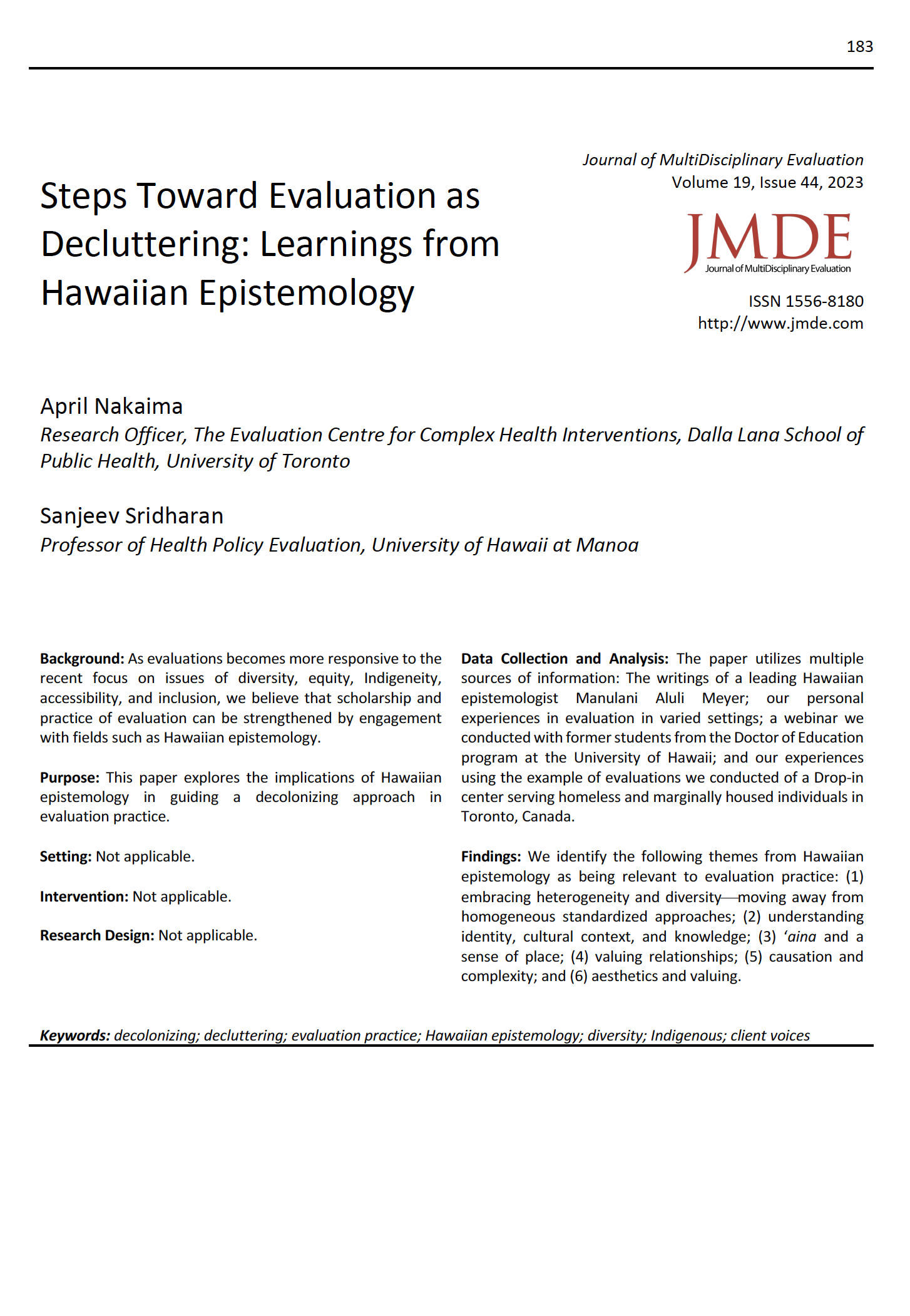Steps Toward Evaluation as Decluttering: Learnings from Hawaiian Epistemology
Main Article Content
Abstract
This paper discusses one of the more contemporary challenges in development and in global health--lots of good ideas from well-meaning insiders and outsiders that end up cluttering both the physical and mental spaces of what can be loosely termed as “attempts” at development. Given the place-based nature of indigenous thought, we turn to Hawaiian epistemology at looking to insights for clarity on how one can negotiate interactions to declutter place and also confuse identity. We believe that evaluation as a field can help in bringing greater recognition of the need for models of development and learning that respect the importance of de-cluttering. Implications for a decolonized approach to evaluation are discussed
Downloads
Article Details

This work is licensed under a Creative Commons Attribution-NonCommercial 4.0 International License.
Copyright and Permissions
Authors retain full copyright for articles published in JMDE. JMDE publishes under a Creative Commons Attribution-NonCommercial 4.0 International License (CC BY - NC 4.0). Users are allowed to copy, distribute, and transmit the work in any medium or format for noncommercial purposes, provided that the original authors and source are credited accurately and appropriately. Only the original authors may distribute the article for commercial or compensatory purposes. To view a copy of this license, visit creativecommons.org
References
Aluli Meyer, M. (2001). Our own liberation: Reflections on Hawaiian epistemology. The Contemporary Pacific,13(1), 124-148. DOI: https://doi.org/10.1353/cp.2001.0024
Aluli Meyer, M. (2013). The context within: My journey into research. In D. M. Mertens, F. Cram, & B. Chilisa (Eds.), Indigenous pathways into social research: Voices of a New Generation (pp. 249–260). Left Coast Press.
CalArts. (n.d.). Equity and Diversity (IDEA) Terminology. Retrieved February 14, 2023, from https://calarts.edu/about/institute/equity-and-diversity-idea/terminology
Cartwright, N. (2007). Hunting causes and using them: Approaches in philosophy and economics. Cambridge University Press. DOI: https://doi.org/10.1017/CBO9780511618758
Davidoff, F. (2017). Can knowledge about heterogeneity in treatment effects help us choose wisely? Annals of Internal Medicine, 166(2), 141–142. https://doi.org/10.7326/M16-1721 DOI: https://doi.org/10.7326/M16-1721
Lieberson, S., & Lynn, F. B. (2002). Barking up the wrong branch: Scientific alternatives to the current model of sociological science. Annual Review of Sociology, 28, 1–19. https://doi.org/10.1146/annurev.soc.28.110601.141122 DOI: https://doi.org/10.1146/annurev.soc.28.110601.141122
Organisation for Economic Co-operation and Development. (n.d.). Evaluation criteria. https://www.oecd.org/dac/evaluation/daccriteriaforevaluatingdevelopmentassistance.htm
Patton, M. Q. (2011). Developmental evaluation: Applying complexity concepts to enhance innovation and use. Guilford Press.
Pawson, R., Greenhalgh, T., Harvey, G., & Walshe, K. (2004). Realist synthesis: An
introduction (ESRC Research Methods Programme Working Paper Series). https://www.betterevaluation.org/tools-resources/realist-synthesis-introduction
Pawson, R. (2008). Causality for beginners (ESRC/NCRM Research Methods Festival). https://eprints.ncrm.ac.uk/id/eprint/245/.
Pawson, R., & Tilley, N (1997) Realistic Evaluation. Sage.
Pawson, R., & Tilley, N. (2004). Realist evaluation: The magenta book guidance notes. Cabinet Office. Available at: https://www.alnap.org/system/files/content/resource/files/main/pawson---tilley-%282004%29-realist-evaluation.pdf
Sridharan, S., Nakaima, A., & Gibson, R. (2023). Nothing about me without me: The central role of program beneficiaries in developing theories of change. Evaluation and Program Planning. https://doi.org/10.1016/j.evalprogplan.2023.102277 DOI: https://doi.org/10.1016/j.evalprogplan.2023.102277
Sridharan, S., Nakaima, A., & Pereira, A. (2023). Causality and Complexity in Evaluating Equity Interventions: Conceptual Issues That Need to Be Addressed in Theory-Driven Evaluation Approaches. Canadian Journal of Program Evaluation, 37(3), 371–388. https://doi.org/10.3138/cjpe.75430 DOI: https://doi.org/10.3138/cjpe.75430

